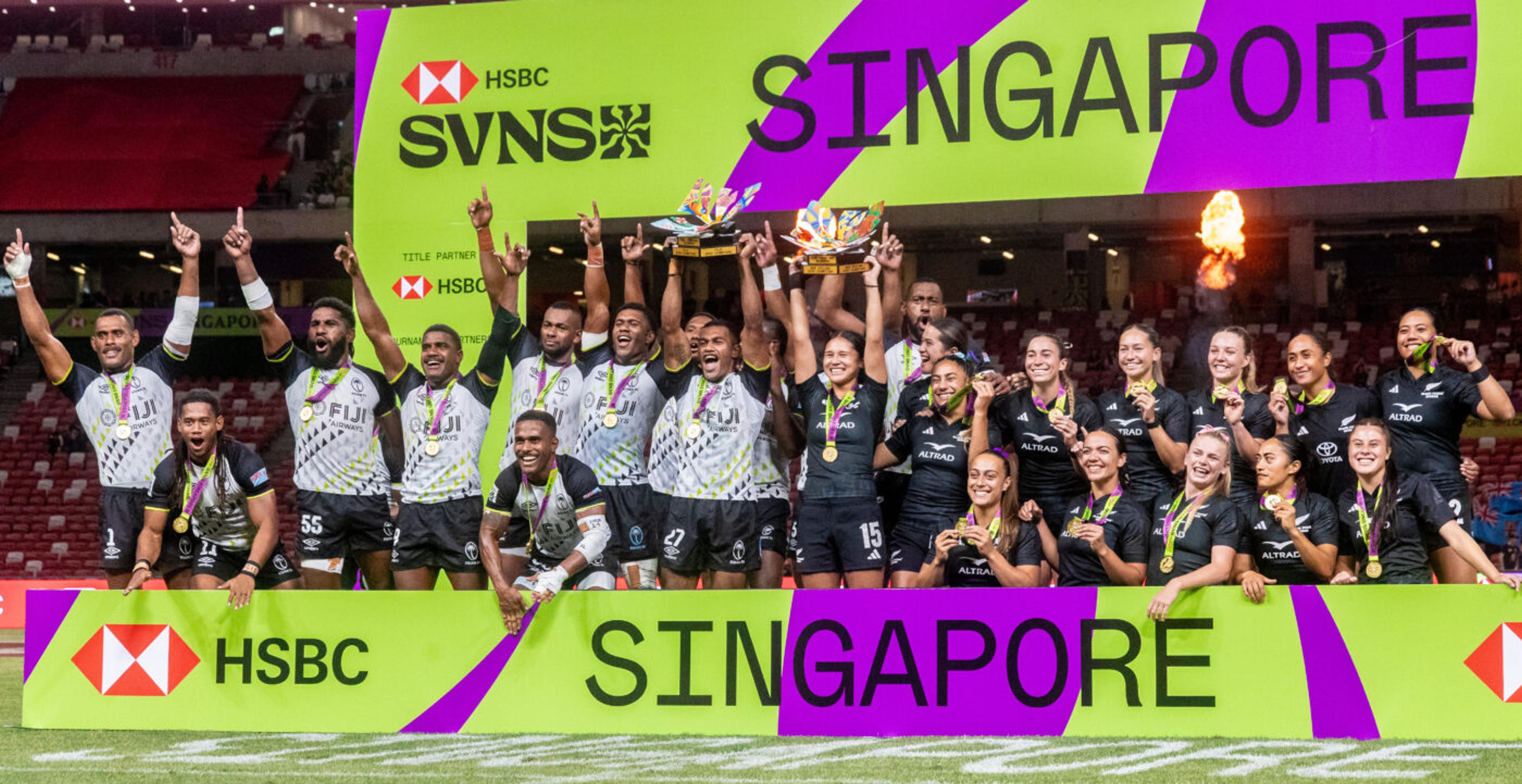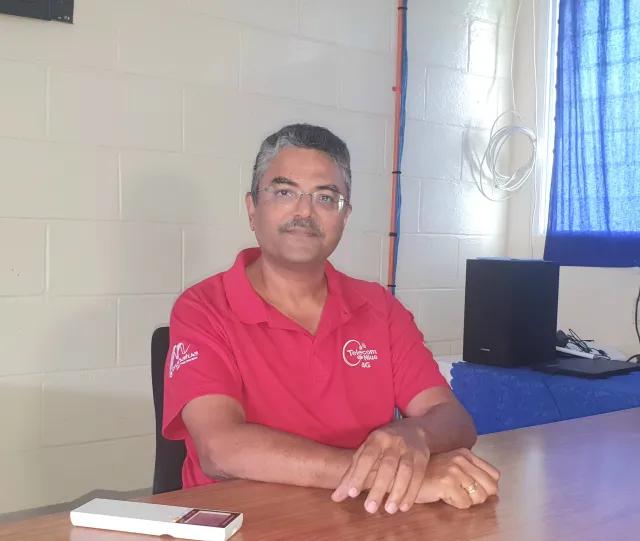

Elon Musks' Starlink emerging popularity in Pacific, draws attention to impacts on regulation laws / Photo: RNZ
Niue Starlink internet users could face strict penalties
Pacific island nations are struggling to deal with the demand for Starlink as locals look for faster internet services.


Visa glitch triggers duplicate charges for Rarotonga visitors


‘Differently ordered brains’: ADHD changes bring hope and hurdles for Pacific families

Fiji roar to winning ways as comeback kings claim Singapore 7s title

Visa glitch triggers duplicate charges for Rarotonga visitors


‘Differently ordered brains’: ADHD changes bring hope and hurdles for Pacific families
Users of the high-speed internet service Starlink are being treated differently in the Pacific, with Niue operators threatened with serious penalties.
The Niue Government has banned the use of the Elon Musk-owned service, warning users of the potential consequences of breaching the Communications Act 1989 which includes a fine of up to $200 or up to three months imprisonment or both.
But renowned musician, entrepreneur, and Starlink advocate Glen Jackson doesn’t believe he breaches the act and is eager to discuss with the government why Starlink is important to his business.

"I'm using both services and putting those services where I can use them to the best of its ability,” said Niuean entrepreneur Glen Jackson
Jackson owns Rocksteady Entertainment, a multimedia business, popularly known for its live-streaming services covering events such as funerals and sports tournaments on the island.
In an interview with Pacific Mornings’ host William Terite last week, Jackson explained that Starlink was crucial for delivering his live streaming services effectively.
He said his primary focus included connecting communities and families, particularly those living abroad.
“I'm not too fussed about the download for Starlink. It was specifically the upload. And that speed was able to allow me to be connected to a service and not be bombarded by others using the network…which will slow down.”
Jackson said local internet speeds were 40 to 50 megabytes per second, whereas Starlink offered speeds of 200 to 380 megabytes per second.
He uses both Starlink and Niue’s primary internet provider, Telecom Niue 4G services. However, with the majority of the population using Telecom 4G, it can slow down and interrupt his live streaming, Jackson said.
This is why he relies on Starlink services to boost connectivity speed to ensure minimal interruption to his live streaming services.
“I think it's about finding that balance. And as a business owner, that's what I'm doing. I'm using both services and putting those services where I can use them to the best of my ability.”
Television Niue reported that the government sent a formal request to the SpaceX legal team in mid-May this year to geo-block Starlink services in Niue. However, there has been no further update since.
Telecom Niue CEO Anurag Tandon told TV Niue that he welcomed the government’s recent decision to restrict the availability of and operation of Starlink services in the country.
“As the primary telecommunications provider in Niue, we are committed to ensuring the highest standards of connectivity and service for our community.”

"We are committed to ensuring the highest standards of connectivity and service for our community," said Telecom Niue CEO Anurag Tandon / Photo: Television Niue
Tandon added that the government’s decision was driven by several key factors such as regulatory compliance, local investment protection in telecommunications infrastructure and services, and national security.
Jackson said having competition in the same space was healthy for any economy.
He noted that the Communications Act of 1989 regulated telecommunications services based on radio communications and licensing at the time.
Jackson said this outdated legislation did not account for modern satellite communications like Starlink.
The government is trying to apply this old law to all communications but unless it is updated, there is no legal issue with using new communications, Jackson said.
“We're just trying to use the freedoms that we have as a people and use the freedoms that we voted for and those options and especially living in Niue, such a beautiful and isolated place and a bubble to be in that once you start chipping away and cutting away those freedoms, then, you know, that starts to play into our democracy as a country.”
Jackson stressed the need for open dialogue between the government, the people, businesses, and users of Starlink to, align on shared goals and regulations.
While he acknowledged the government’s need to regulate and tax services, Jackson said there should be consultations and collaboration before changes are implemented.
“To know that we can all be on the same page if law does come into play in changing the law, then allow us to be part of that conversation.”
The use of Starlink is handled differently throughout the region, with some countries banning it outright and others openly welcoming the service.
Watch the full interview with Glen Jackson below.
Starlink in the Pacific
While Niue is fighting its own battle to regulate Starlink operations, other Pacific islands are also facing challenges with the emergence of this high-speed satellite internet provider.
Tonga
On July 19, 2024, the Tongan Government issued a provisional temporary permit for Starlink to operate in the Kingdom for six months.
This followed after recent events where the government instructed Starlink to cease its services in Tonga due to illegal use of satellite terminals and disruptions caused by the undersea fibre cable outage to Vava’u and Ha’apai Islands since June 29.
“The issuance of this permit aims to address public concerns while ensuring that operations are conducted by regulatory requirements, resorting to the connectivity outages in the outer islands, while the application for a full license is finalising,” a government statement said.
Samoa
In Samoa, Starlink was initially banned in January due to unauthorised use.
Later in March, the government approved the use of Starlink services, welcoming the strategic partnership which aims to explore avenues for retaining a portion of the revenue generated from Starlink services within the local economy.
In June, Samoa Observer reported that people could import Starlink kits and it could take up to two years to grant a licence to SpaceX as the necessary paperwork had not yet been received.
Fiji
In November 2023, Starlink received licences and began operations in over 300 islands by May this year.
Deputy Prime Minister and Minister for Trade, Co-operatives, Small and Medium Enterprises (SMEs), and Communications, Manoa Kamikamica welcomed the Starlink licensing in Fiji.
“The licensing of Starlink for commercial use is a game changer for Fiji as it strengthens our resilience in providing connectivity during natural disasters. This also serves the purpose of the Fiji Government’s efforts in connecting the unconnected population in maritime communities without significant upfront capital costs incurred,” he said.

Photo: The Fiji Times
Papua New Guinea
In January, Papua New Guinea’s National Information and Communication Technology Authority (NICTA) granted a five-year operator licence to Starlink.
According to the Australia Pacific Business Connections, this was confirmed by PNG’s Minister of Information and Communications Technology Timothy Masiu.
He declared the licence as a New Year’s gift to Papua New Guinea, emphasising the positive impact it would have on the nation’s ICT sector.
NICTA chairman Noel Mobia also highlighted the transformative potential of Starlink’s technology, emphasising the significant reduction in costs compared to traditional fixed-orbit satellites. This, he noted, would enable the government to connect remote schools effectively.
Vanuatu
In February 2023, Starlink was initially banned in Vanuatu. It wasn’t until April this year that Starlink was given a temporary restricted licence to operate after the severe twin cyclones battered the country.
Regulator Brian Winji said Vanuatu needed to clear one more hurdle, requiring a business licence from the Customs Department before it received ongoing approval to operate in Vanuatu.

Milroy Cainton with his Starlink equipment during the SOE, before it was confiscated by the authorities / Photo: Vanuatu Business Review
“Until then, Vanuatu's Telecommunications Radiocommunications and Broadcasting Regulator has told internet users that Starlink equipment will be confiscated at the border.”
Cook Islands
Like Niue, Starlink is illegally operated in the Cook Islands by some locals.
In February, Cook Islands Prime Minister Mark Brown announced he would not restrict importing and using Starlink, despite concerns that Customs was imposing a fee on the kit.
According to Islands Business, Cook Islands telecommunications regulator head Bernard Hill stressed the importance of having improved and diverse communications services, particularly in times of natural disasters.
He said countries needed backup options in case something went wrong, referring to the Hunga Tonga-Hunga-Ha'apai volcano eruption that destroyed Tonga’s internet cable in January 2022.
Hill said as more Pacific economies depended on internet services being cut off, this could be disastrous.
From the point of view of redundancy and resilience, having access to services from overhead as well as undersea is pretty important, " Hill said.
Some experts hope the conversation is part of the Pacific Islands Forum leaders’ meeting in Tonga later this month.
Elon Musk, whose SpaceX operates Starlink, has been reportedly invited to the Forum leaders' meeting.